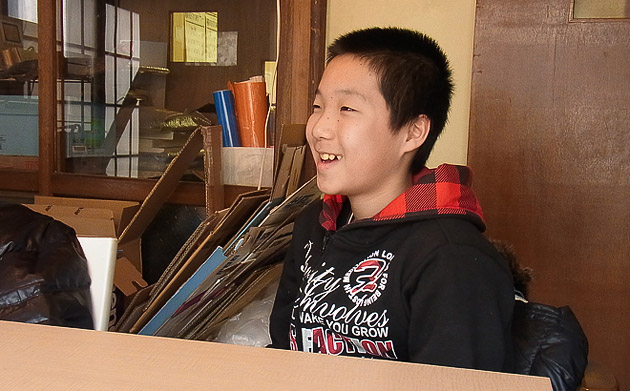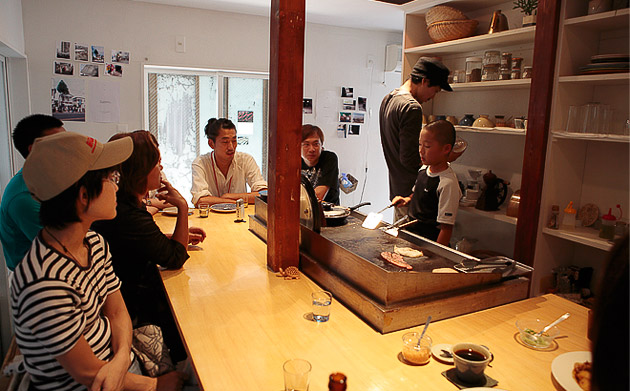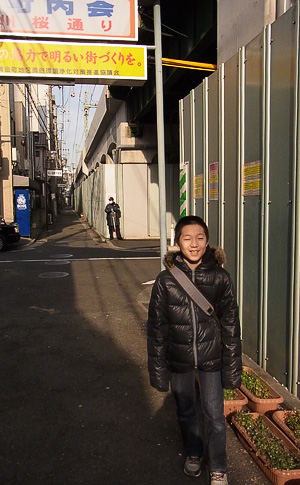Koyo Chiba
― Could you introduce yourself for us?
My name is Koyo Chiba. I was born on July 6, 1998, and I am a 6th grader in Azumasho Elementary. I was born at the hospital at Minatomirai and live in an apartment in front of Hinodecho Station. We moved to our current house when I was in pre-school.
My favorite sport is baseball, and I've started playing basketball. I plan to join the basketball team with my friends when we get into junior high.
I'll be going to the local Oimatsu Junior-High School. Although I didn't, a lot of other students took entrance exams for private schools. Those students will be going to a different school, but we all have cell phones and stuff, so it's not really that sad.
I usually play basketball and video games, or play with origami or clay on days when my dad works late. Lately, I've been obsessed with Derby Stallion. I also watch pro-wrestling on TV at night.

― Has your father's always lived here?
Yeah. He's 48 now, and went to the same elementary and junior high school as me. He's lived in this area his entire life; growing up playing in this town. I don't know if it's because he's popular, but he knows a lot of people, and shows up to a lot of the local events. My dad taught me 'Greet everyone you meet', so I learned how to at least greet people from early on. So now, even when meeting someone new, they often tell me 'You've gotten so big!'
― Do you have any memory of this area before 'Operation Bye-bye'?
I must have walked around the area a lot, but I have almost no memory of it. About all that I remember is that there must have been a lot of policemen around. But when we started going to the Bazaar (Koganecho Bazaar), my dad started to tell me all sorts of things about the town. When my dad was a kid, one of his good friends lived on the second floor of one of those types of bars. When he would go over and play, the first floor was an actual shop, so they would often give him juice and stuff. Later, I became more familiar with the town, like the history, after reading books from the Koganecho Bazaar and researching a little bit on my own.
― How did you become involved with the 'Koganecho Bazaar'?
It started with an exhibit at the first annual 'Koganecho Bazaar' in 2008. I was in 4th grade. It was at the reception the day before the opening of the exhibit. On my route home from school, a lot of people had gathered. This wasn't a place where people gathered like that and I thought it was interesting, so I wanted to know what was going on. I asked around and they told me 'The Bazaar is opening up tomorrow, so feel free to stop by'. So I came back the next day. One day on my way to the Bazaar, one of the volunteers at the Koganecho Studio asked if I wanted to volunteer, and that's how I started helping out as a volunteer.
― Looking back on the last three years of the 'Koganecho Bazaar', what impression do you have?
I've been here almost the entire three years, but that first 'Bazaar' in 2008 is the one that I remember most. Of course it was the very first one, and everything was a new experience so it makes a strong impact. But I also think that first year held a lot of significance. What I mean is I think that the artists in that first year were really friendly and the local people loved them. The artists lately seem to be from their own world and create their art to draw you into it. Compared to the earlier artists, you can't really communicate.
― Specifically, how were they friendly?
I think it was their smile. I don't know if it's because it's difficult, but I feel like people don't really have that natural, every-day smile. You want to greet them but there's this air of 'Don't!' Greeting people during that first year was extremely easy.
― What do you think about the artists' work?
I think that some of it is really great, but the work doesn't really have a meaning for me. I like talking with people more.
― Is that the influence of your father teaching you how to greet people?
After coming to the 'Bazaar', I came to appreciate how important it was to greet people. If you don't greet people, you don't talk to people, and therefore you don't get to know each other. Just start with 'Hello', and slowly the connection will grow.
― Are any of your classmates involved in this kind of 'Bazaar'?
There are a few kids who get involved only during the 'Bazaar'. I'm about the only one who comes year around. Because I have the time (laughs).
― Koganecho Bazaar gave birth to a place where you can spend your free time. Do you think that's a good thing?
It's a great help. You're able to talk about things that you can't with your parents. My dad commented before that, 'Even if I couldn't talk to my father, it's nice that there are a lot of other people that I could talk to.' You feel safe as a parent having and going to the 'Bazaar'.
― I think that kids today don't really have the communication skills to actively socialize with the local people and these 'otherworldly' artists, but what do you think?
I think so too. Even when I look at kids from other schools and see that they can't even greet anyone, I wonder 'What are they thinking?' That actually goes for a lot of adults too (laughs). When there are fights in school, it's usually a probably that comes up because the communication is poor. The other person doesn't seem to understand what you're trying to say. Teachers and people around here sometimes tell me 'You should really act more like a kid.' (laughs)
― Has your image of this town changed because of the 'Bazaar'?
It's changed. I've come to think that this area is great. People here are really nice.
This place even comes up in my dreams when I sleep.

2009.9.26 L CAMP Let's be the one-day chef!
― What kind of dreams?
It's just a normal dream. I'm just walking around town, greeting people. A lot of people come by, and it feels like the town gets really lively.
― Instead of your dreams when you sleep, what about your dreams of the future
I've only talked with teachers at school, but my dream of the future is set. Right now, the first floor of our house is a bar that we rent out to someone, but I want to make that my own cafÈ. I also want to open up a store in both Koganecho and Hinodecho. I like making food and usually make my own dinner. Looking forward to opening my own shops, I've already started to practice making some bar food, and I'm now studying how to make nimono.
― Nimono is low-key (laughs)
Later on, I would like to use the Keikyuu train line and make this area a bigger tourist spot than Minatomirai. That is my dream. Now, no one but those who gamble on the horse races and boat races use the red trains on the Keikyuu line. (laughs)
The line is actually really useful. It's close to Yokohama, and if you come via the Haneda International line, you can take it all the way down non-stop to Miura Coast. I think that we have to rethink the Keikyuu line.
 ― Specifically, how would you like to change this town?
― Specifically, how would you like to change this town?
I would like it to be a place where a lot of people come and one that overflows with smiling faces. As long as the fences are up under the overhead structures, I think that the dark atmosphere will continue. I think that things will change depending on how they use the space behind the steel fencing once it's taken down.
I'd also like to make some parks since there aren't that many. I've been saying this since 2008, but other kids find the empty areas under the overhead structures that the 'Bazaar' created kind of hard to enter.
― Doesn't it feel like the dreams and future of this area is kind of piling up?
Yes, it's piling up. I've had that feeling since last year.
It started during last year's 'Cherry Blossom Festival'. There were so many people that came to see the trees. Seeing that was so much fun, and I thought that a town like is great. I thought, 'I want to continue living here.' Even people who come for their first time, they see that and think this town is great. That kind of town is ideal, you know.
Data: 29.01.2011
Interview with Koyo Chiba
Interviewer:Takaaki Kato, Takahiro Masuzaki
Data: 12.12.2010
Interview with Kikuko Hosoi
Interviewer: Takahiro Masuzaki
Data: 19.12.2010
Interview with Seigo Akitsu
Interviewed by Takahiro Masuzaki